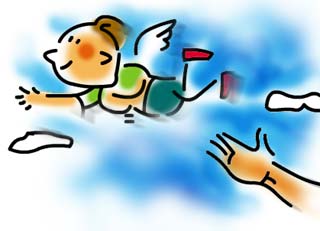 | « Back to article | Print this article |
6 things a student must know before going to UK
Travelling to the UK to study for the first time? We take you through a quick orientation process.
You have received the confirmation letter from your university and are planning to travel to your dream university soon. While some of you have applied for your visa, and others are waiting for it, there are a lot of other things you need to bear in mind about your first foreign trip as a student.
At the Education UK Orientation programme held on 18 July in Mumbai, British Council delegates addressed the participants to acquaint and prepare them for a new way of life.
This was followed by a QnA session with alumni members. We briefly take you through the orientation on things you need to consider before travelling, during and after landing up at your destination right from travelling tips to accommodation and getting settled.
Pre-journey tips
- Check with your airlines for student discounts on airfares.
- Avoid travelling on a weekend. Universities remain closed on weekends, so finding an authority to assist/welcome you would be difficult.
- Choose an airport that's closer to your university. Also check for the transit time between connecting flights.
- Check with your airlines for maximum luggage weight allowed. Considering that during admission season, a majority of travellers are students, most airlines allow you to carry extra luggage, you may want to use that privilege.
Click NEXT to read more
'Avoid carrying stuff that can be readily available there'
1. What should I carry?
- Remember to carry original documents of all your education and previous work employer-related certificates.
- Make two copies of the documents. While you carry the originals in your main luggage, do remember to carry a copy of the same in your hand luggage, for safety purposes.
- As far as possible, try to travel light. Avoid carrying stuff that can be readily available there. Eg. Food items.
- Remember to carry three-pin plugs/adaptors for charging your electrical devices like mobile phones, laptop etc. Two pin devices won't work in the UK. If you don't find them in your country, you may buy it once you land in UK.
- You are travelling to a foreign country. Your local number/phone will not be accessible there, so carry an international calling card to communicate and stay in touch with your family.
- Always carry your university s board line number for immediate use.
- Most UK campuses have elaborate walking spaces. It is advisable to carry a pair of walking shoes.
- The weather in the UK is mostly windy/rainy throughout the year. Do carry your umbrella/raincoats and rainy shoes.
- UK is a multi-cultural country. Most universities host cultural events, so, you must carry at least one set of traditional attire that represents your nationality/culture. Also carry one set of formal attire and one party wear.
- You will be staying away from your friends, family and loved ones. Do carry an album of images of your dear ones, in case you feel homesick in the initial few months.
- Kindly check your luggage for banned items in the UK. You should find the same on http://www.hmrc.gov.uk/customs/banned-restricted.htm
Click NEXT to read more
'Campus accommodation is the best'
After landing in UK
- Opt for public transport. Trams, buses and trains are cheaper against cabs that are more expensive. Unless in an emergency, avoid hiring a cab.
- You are in a new city, so do not hesitate to ask for directions.
2. How do I find the right accommodation?
- Plan in advance. Go for on-campus accommodation. It's cheap and best.
- Choose a place that's closer to the university.
- Rented accommodation will not cover electricity and food. That eventually adds up to extra cost.
- Given a choice, mingle with like minded individuals and make them your roommates.
- If you are a student, do not travel with dependants, unless necessary.
Tips from alumni
"Do not get fooled by images of apartments put up on websites. If possible, arrange for a local viewing by a friend/relative who stays there. If you don't know anyone there, it is advisable that you book the place only after you have seen it yourself. Also check for details of your landlord and read your agreement carefully for loopholes. If there are damage fees included in the contract document, you must inspect the apartment carefully before signing on the dotted line," warns Ashish Mehta, an alumnus from the University of Nottingham.
"If you haven't been able to manage an accommodation for you, you may stay in a BnB (Bed and Breakfast) guesthouse for a week and find out the best deals once you get there," she continues.
"Campus accommodation is the best. It covers all your cost. You can avail of all the facilities and also avoid travelling time," suggests Karan Desai, an alumnus of University of Westminster, London.
"If you are going for rented accommodation, you may also want to check the nearby surroundings. Although some estate agents/websites will offer you best deals outside the city, not all places in London or UK are safe for students," adds Srinath Iyer, an alumnus of London School of Economics.
Click NEXT to read more
'Avoid eating out, it's very expensive'
3. How do I keep a tab on my expenses?
- Keep disposable cash on hand for immediate use.
- For initial transactions, you may want to use a calculator to know how much you are spending.
- Once you reach there, apply for a local bank account for convenience of transactions. For the same, you will need to produce a written letter of reference from your existing local bank in your country of residence.
- Choose a bank that is available locally, within campus limits.
- Keep a tab on your spending. Unless necessary, do not indulge in spending from your pocket.
- UK has plenty of local markets and supermarkets for food. You may also want to learn some basic cooking back home tea, coffee, sandwiches etc.
- Avoid eating out, it's very expensive.
Click NEXT to read more
'Keep useful medication at hand'
5. How do I take care of my personal health?
- If you are suffering from any illness, remember to carry at least a month's stock of your medicines along with your doctor prescription.
- Also keep useful medication like band aids, paracetamol and aspirin at hand. You will not be able to procure any medicine from the chemist without a relevant doctor prescription.
- If you are staying in the UK for more than 6 months, you are eligible for free medical treatment under the National Health Service (NHS) scheme.
- For the same, you need to register yourself and claim your NHS card and number. This will entitle you to avail of free consultation services.
- The NHS scheme does not cover dental and eye care. So, if you want to get a dental check up/corrective surgery done, get it done from your home country. Keep an extra pair of lenses/glasses for use.
Click NEXT to read more
Make use of the international exposure
6. Getting used to the British way of life
Travelling and living in a foreign country can be initially difficult but you will eventually get used to it. The UK is a multi-cultural society which makes it a comfortable place to reside for students across the globe. However, bear the following in mind:
- If you are an Indian citizen, do not restrict yourself to Indian groups alone. Make use of the international exposure; network with students and seniors from other countries in your college and profession to gain knowledge and information.
- Be open and learn to respect the culture and traditions of international students in your college.
- When in class, do not hesitate to ask questions or interrogate the professor, if you feel the need to. May you may face problems of language or syllabus; consult your assigned professor/mentor/counsellor for help.
- Participate in college activities that interest you. Take some time off to learn a new sport or new activity.
- Register yourself with the student union. Check the University notice board/ website regularly for updates on events and activities.
- On weekends and holidays, plan a sight seeing trip to visit and acquaint yourselves to the places nearby.
Make the most of your international education and exposure!





